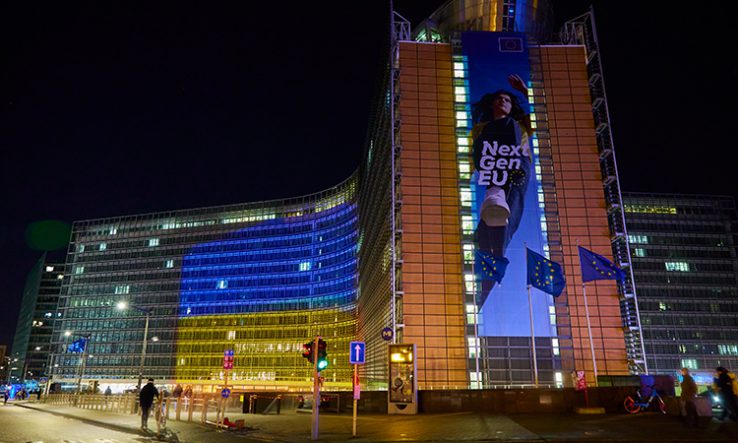
Image: European Union, 2022
Ministry says European Commission already working on information platform for Ukrainian researchers
Spain’s Ministry of Science and Innovation has announced that it plans to push for direct EU support for Ukrainian research and innovation, as Ukraine continues to be devastated by more than two weeks of Russian military action.
The ministry announced on 10 March that it would “propose the creation of a line of projects, at European level, for the recovery of the Ukrainian science and innovation system”. It did not specify what such projects would entail, or how it thinks they should be funded.
As Research Professional News has previously reported, organisations including Scholars at Risk, which supports academics under threat, are pushing national governments and the EU to provide fellowship schemes to help Ukrainian researchers displaced by the Russian invasion.
Russian bombs continue to rain down on civil infrastructure and residential areas in Ukraine, killing hundreds of civilians so far. University buildings have been among those damaged, while academics are among the millions of citizens whose lives have been upended by the violence.
Information platform ‘being worked on’
Spain’s ministry said the European Commission is already working on creating an information platform to help Ukrainian researchers find aid and support programmes, which it said will be called ‘ERA for Ukraine’ after the European Research Area package of EU-led policies for boosting European research. The ministry said it was happy to contribute to this “joint” effort.
Research Professional News has approached the Commission for comment. The Commission has helped to coordinate EU support for Ukraine, and it lit up its Brussels headquarters in the colours of the country’s flag in an expression of solidarity (pictured).
European academic organisations including the European Council of Doctoral Candidates and Junior Researchers have called for the EU to provide centralised access to information on support measures being offered to Ukrainian researchers. A website called Science For Ukraine is providing some information of this kind, while Scholars at Risk has said that institutions across Europe are offering support.
Like many European governments before it, the Spanish ministry said it was suspending all of its bilateral projects and contracts involving Russian research organisations in response to the invasion.
“Spain has always defended scientific, technical and innovation cooperation based on universal principles and values,” said science minister Diana Morant. “The aggression ordered by the Russian government to Ukraine is unacceptable and violates these principles.”
More investment in R&I
Elsewhere, the European Parliament president Roberta Metsola said the EU had an urgent “need to boost our investment in defence and in innovative technologies” in the wake of the invasion, which she said “shattered the peace we have long known in Europe [and] changed everything, probably forever”.
She said the EU needs to “restructure” its economy and invest in “research and raw materials” to help secure its place in this drastically changed world.
Meanwhile, individual academic organisations are continuing to offer support to Ukraine while cutting ties with Russia.
The Coimbra association of European universities announced on 10 March that it was suspending the membership of St Petersburg State University after its rector signed a joint statement backing the invasion. “This decision does not jeopardise in any manner Coimbra Group’s inclusiveness and solidarity with all those individually impacted by Russia’s invasion of Ukraine, as well as those opposing the war, whatever their nationality”, the association said.
Scholarly publisher Wiley announced on the same day that it was pledging US$1 million (€911,000) to humanitarian organisations providing aid to Ukraine, while also “making our entire body of scholarly content freely available to researchers and students from Ukraine and working internally and with partners to support Ukrainian scientists, academics and authors during this challenging time”.